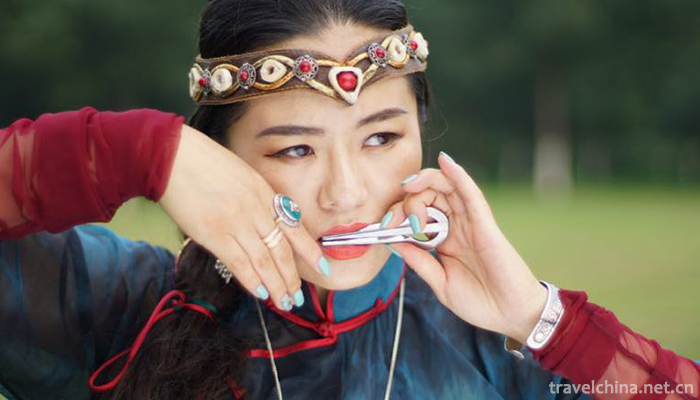Chord music
The mouth string is also known as the sounding strip, the strip spring and the mouth spring. It is a small musical instrument which is deeply loved by the minority compatriots. The content of playing harmonica is extremely rich. It can play folk songs, mountain music, combination music, question-and-answer music, and scolding music. Its melody is elegant, rich and pleasant. Almost everyone of the young girls of Yi, Nu, Jingpo, Lisu and Naxi nationalities in Yunnan Province can play the tune.
Yunnan's mouth chord is made of bamboo slices about three inches long and five minutes wide, with shallow grooves carved in the middle and spring teeth drawn from bamboo slices at the bottom of grooves (some of which are made of thin copper or silver slices). When playing, the left hand holds one end of the bamboo slice, and the other end is placed at the mouth, so that the breathing air can agitate the reed. At the same time, the right finger cooperates with the gentle flick of the bamboo slice. With the change of the air flow and the flick of the finger, the beautiful melody will be produced.
On June 7, 2008, oral music was approved by the State Council to be included in the second batch of national intangible cultural heritage list.
historical origin
The mouth string is a small musical instrument which is deeply loved by the minority compatriots. Almost everyone of the young girls of the Yi, Nu, Jingpo, Lisu and Naxi nationalities in Yunnan Province can play the chord. In the Yi long poem Ashima, people say that they love it as a treasure.
In ancient Chinese literature, the harmonica string is also called "harmonica". There is a record of "men playing Lusheng and women playing harmonica" in Ming anus Nanzhaoyu History. The formation and production of "harmonica" were recorded in Yuheng Zhi of Southern Yunnan in Qing Dynasty. In Tang and Song Dynasties, the "iron leaf spring" and other reed-pulling instruments were the predecessors of the mouth strings. As for the origin of the mouth string, there is a legend circulating among the minority nationalities in Yunnan. It is said that the Ming Dynasty ruled Lijiang wooden chieftain of the Naxi and Lisu nationalities, oppressed the people and acted wickedly, making the people bored and resentful. The Chief Civil Sergeant was afraid that the people would gather to discuss his sins and resist his rule, so he formulated a rule of common sense: people were not allowed to talk, even fathers and sons, couples were no exception. If violators were minor, they would be flogged; if violators were serious, they would be killed in public. The tyranny of the wood chieftain made the people more angry, and people tried every means to resist him. The wise Lisu people came up with a way. They created an instrument, the mouth string. They used the mouth string to speak instead of themselves and express their hearts, which made the chieftain's trick fail.
artistic characteristics
The voice quality of the mouth string is unique and beautiful. It touches people's hearts and places them between their lips and teeth. It can pour out their hearts and voices with unusual aesthetic functions. The mouth string is a semantic music, which is good at imitating language, especially the music of Yi language and the voice of the mouth string are different from each other. Therefore, the people of Yi nationality say that "the mouth string can speak, and the Moon Qin can sing" is not chaotic. Passed the voice, played a role in the exchange of information.
Inheritance significance
Oral chords have been fully integrated into the emotional world and spiritual life of the Yi people. They are an indispensable and important part of the daily life of the Yi people. However, the oral chords of other ethnic groups are only primitive things and objects. Oral chords play different roles in the life of different nationalities.
Oral strings are the oldest musical instrument recorded by the Yi people. The chords of other nationalities are still in the primitive stage. Zeng Lingshi, for example, said that if the chords of other nationalities were still in kindergarten stage, the development of Yi's chords had at least graduated from middle school and even entered university stage. He said that although the scientific principle of accent string pronunciation is all overtone combination, the change from single piece playing with line to more than two pieces playing with finger (Liangshan is all finger), is not only the development and progress of performance methods and techniques, but also shows the historical development process of the accent string.

0 Questions
Ask a Question
Your email address will not be published.